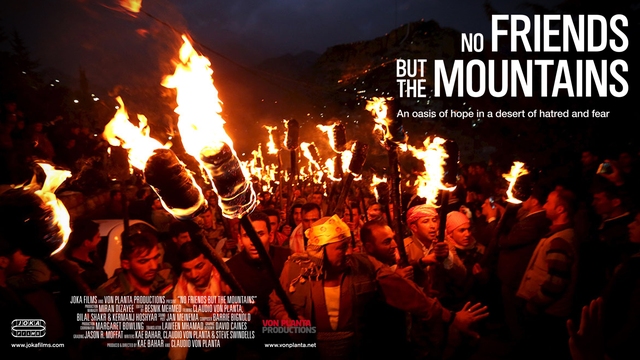With the rise of ISIS and the central role played by the Kurdish Peshmerga in the fight against them, the question of Kurdish independence has taken on greater urgency. To answer this pressing question, Kurdish author Kae Bahar travels from his London home to his rocky and mountainous homeland, finding a complex mix of Kurdish nationalism and internal division. ‘War or Peace?’ Bahar asks. The answer is not so simple.
When Kae Bahar was 14 years old he was tortured by Saddam Hussein's secret police. Thirty years on, he returns to the place of his torment:
"They pulled me upside down with my head down, and one with a cable started to hit the bottom of my feet." By fate, he meets the man that turned him in thirty years ago:
"They tortured me too…I had to do it", the man explains. After a tense exchange, they embrace. Their story of intense trauma is shared by Kurds across the region, as is their determination to put the past aside and look to the future.
After fleeing Iraq to build life in London, Kae returns to Iraqi Kurdistan to fight the cause of Kurdish independence. The Kurds are the largest ethnic minority in the world without a sovereign state; their population split across Turkey, Syria, Iran, and Iraq, with a large diaspora spread across the world.
Kurdish troops from across the Kurdish regions lead the fight against ISIS:
"fighting Daesh not just for themselves, but for the civilised world", Kae explains. Whereas ISIS represents the very worst of violent religious fundamentalism, Kae envisions a Kurdish state that could enshrine democratic principles, becoming a
"very open and progressive country in the Middle East."
However, as he travels around the country, rallying support for independence, internal divisions appear. Captain Hussein of the Peshmerga tells him that
"The Kurdish leaders are not yet politically united to liberate Kurdistan."
One of the most potent tools for fostering internal cohesion is the celebration of Kurdish culture.
"It's not just about guns and war", Kae muses; his travels enlivened by rich music and dance, and punctuated by mystical digressions into the ancient history of Kurdish lands.
As Kae moves freely in the city of Kirkuk, administered peacefully by the Kurds, he considers the good that a Kurdish nation could bring to the region:
"In a desert of hatred and fear, Kurdistan is an oasis of hope where everybody can live in peace."
Reviews
“
No Friends but the Mountains
is an exquisite film beyond words” –
Utah Film Festival
Festivals

Slemani International Film Festival - Best Documentary Film

Festival Cinematográfico de Mérida - Official Selection

Copenhagen Kurdische Film Festival - Official Selection

Festival de largos y cortos de Santiago - Official Selection

Tiburon International Film Festival - Official Selection

FICIP International Political Film Festival - Official Selection

Salon International de la luz - Official Selection

Festival Int. De cine bajo la luna lepe - Official Selection

Utah Film Festival and Awards - Official Selection
 With the rise of ISIS and the central role played by the Kurdish Peshmerga in the fight against them, the question of Kurdish independence has taken on greater urgency. To answer this pressing question, Kurdish author Kae Bahar travels from his London home to his rocky and mountainous homeland, finding a complex mix of Kurdish nationalism and internal division. ‘War or Peace?’ Bahar asks. The answer is not so simple.
With the rise of ISIS and the central role played by the Kurdish Peshmerga in the fight against them, the question of Kurdish independence has taken on greater urgency. To answer this pressing question, Kurdish author Kae Bahar travels from his London home to his rocky and mountainous homeland, finding a complex mix of Kurdish nationalism and internal division. ‘War or Peace?’ Bahar asks. The answer is not so simple.
 Slemani International Film Festival - Best Documentary Film
Slemani International Film Festival - Best Documentary Film Festival Cinematográfico de Mérida - Official Selection
Festival Cinematográfico de Mérida - Official Selection Copenhagen Kurdische Film Festival - Official Selection
Copenhagen Kurdische Film Festival - Official Selection Festival de largos y cortos de Santiago - Official Selection
Festival de largos y cortos de Santiago - Official Selection Tiburon International Film Festival - Official Selection
Tiburon International Film Festival - Official Selection  FICIP International Political Film Festival - Official Selection
FICIP International Political Film Festival - Official Selection  Salon International de la luz - Official Selection
Salon International de la luz - Official Selection Festival Int. De cine bajo la luna lepe - Official Selection
Festival Int. De cine bajo la luna lepe - Official Selection
 Utah Film Festival and Awards - Official Selection
Utah Film Festival and Awards - Official Selection






